新牛津译林版英语七年级上册第四单元基础知识
牛津译林版七年级英语上册 Unit4 单词、短语、知识点复习 (无答案)
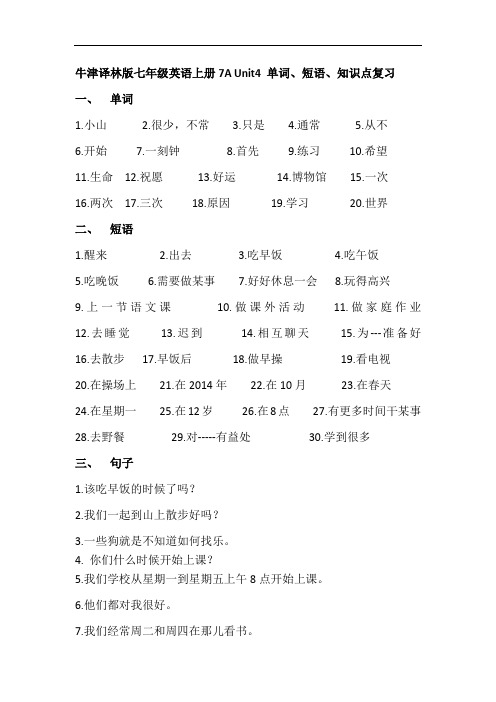
牛津译林版七年级英语上册7A Unit4 单词、短语、知识点复习一、单词1.小山2.很少,不常3.只是4.通常5.从不6.开始7.一刻钟8.首先9.练习10.希望11.生命12.祝愿13.好运14.博物馆15.一次16.两次17.三次18.原因19.学习20.世界二、短语1.醒来2.出去3.吃早饭4.吃午饭5.吃晚饭6.需要做某事7.好好休息一会8.玩得高兴9.上一节语文课10.做课外活动11.做家庭作业12.去睡觉13.迟到14.相互聊天15.为---准备好16.去散步17.早饭后18.做早操19.看电视20.在操场上21.在2014年22.在10月23.在春天24.在星期一25.在12岁26.在8点27.有更多时间干某事28.去野餐29.对-----有益处30.学到很多三、句子1.该吃早饭的时候了吗?2.我们一起到山上散步好吗?3.一些狗就是不知道如何找乐。
4. 你们什么时候开始上课?5.我们学校从星期一到星期五上午8点开始上课。
6.他们都对我很好。
7.我们经常周二和周四在那儿看书。
8.我想告诉你关于我在这儿的生活情况。
9.桑迪没有太多的时间打网球。
10.你多长时间参观一次博物馆。
四、重要知识点.1.It’s time for sth;It’s time to do sth.2.Shall we do sth?3.玩得高兴:have fun;have a goog/nice/great/wonderful time.4.be late for.5.be nice/kind to sb.6.chat with sb=talk with/to sb.7.practise doing sth.8.want=would like to do sth.9.between and .10.be good for.11.get ready for和be ready for 区别。
12.too many和too much 区别。
Unit4知识点 牛津译林版英语七年级上册

7AU4知识点New words and expressions:1.wake up.He wakes up at six o’clock.1.He wakes her up at seven o’clock.2/Shall we go fishing this afternoon?OK/Good idea! That’s all right. (No,let’s go shopping.3.He seldom goes out.He’s never late for school.4.She has breakfast/lunch/dinner.5.I need to go home early6.have a good rest7.have fun/have a good (great) time (in) doing sth.I have fun playing football8.have lessons/have an English lesson.9.after-school activities10.do one’s homeworkHe does his homework/We do our homework.He doesn’t do his homework./Does he do his homework?11.go to bed. He goes to bed at 9/He gets up at six .12.be late for He is late for school/the meeting.13.The meeting/Our school starts at 8 o’clock.14.a quarter past six/seven half past eight15.at six in th emorning/afternoon16.play football first.17.chat with him/her chat with each other18.learn from each other/ help each other19wish best wishes wish you successWish your team good luck.20.would like to go shopping.Would you like to go shopping this afternoo ?21.save my life---save their lives.22.go to the museum.23twice a week/once a year. How often does he go home?24.go on a picnic=go on picnics25.dislike playing games27.get ready for th eparty/th emeeting.28.learn a lot about the worldLanguage points: 1.It’s time for breakfast=It’s time to have breakfast2.Shall we go running/walking in the hill?3.I seldom go out /play games.4.After sleep I sleep.5.nad a good rest/He needs some milk.6.I don’t know how to have fun/what to do /how to do it/where to go7.What time do you strat lessons?8enjoy myself/enjoy working in Beijing/living in Shanghai.9.talk about playing games.10.from Monday to Friday—five days a week.11.Our lessons begin at 8:15.12.My favourite subject is English/sport is swimming.13.a lot of friends—lots of /many14.They are all nice(kind) to us---All of them are nice to us.15.a Reading Club16.read books/borrow books from the library.17.I also like playing volleyball.18.I’m in the school volleyball team=I’m a member of the school team.19.on Wednesday afternoon20.in the evening/in March/in winter/in 2202/in 2012.321.on Saturday/on 1 July/on Sunday morning/on Children’s Dayon a cold morningo/ on the afternoon of September 122.at seven o’clock/at 6 years old/at Christmas23.Thanks for your e-mail/giving me a pen/helping us with our English.24.tell you about my life/tell us about your school.25.I’m good at playing football=I play footballwell.26.He often plays football in the playground.27.She doesn’t have lunch time to play tennisShe has atime to sing.28.She’s a member of th eswimming team.She usually swims after school.29.He never plays basketball.30.He goes to her dancing lessons.31.She always dances for half an hour.32.She sometimes goes roller skating.33.Saturday ,7 November.34.Welcome to our schol/our school football match.35.There’s a volleyball match between A and B.36.He goes there by bus.37.I hope everyone can come and watch the game.38Wish our team good luck.39.What do you like to do at weekends?40.How often do you visit the Great Wall.Twice a month41.Morning exercises are good fo rus.42.Reading in th esun is bad for your eyes.43.have too much homework to do.44.so I can’t play basketball well.45.It helps me get ready for the day.48.I don’t like singing.49.It’s fun/interesting.。
2024-2025学年牛津译林版七年级英语上册+Unit+4+新版+词汇表讲解
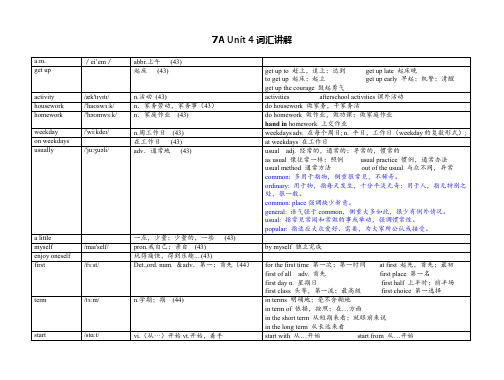
7A Unit 4词汇讲解a.m./ei’em/abbr.上午(43)get up 起床(43)get up to 赶上,追上;达到get up late 起床晚to get up 起床;起立get up early 早起;机警;清醒get up the courage 鼓起勇气activity/æk'tɪvɪtɪ/n.活动(43)activities afterschool activities课外活动housework/'haʊswɜːk/n.家务劳动,家务事(43)do housework 做家务,干家务活homework/'həʊmwɜːk/n.家庭作业(43)do homework 做作业,做功课;做家庭作业hand in homework 上交作业weekday/'wiːkdeɪ/n.周工作日(43)weekdays adv. 在每个周日; n. 平日,工作日((weekday的复数形式); on weekdays 在工作日(43)at weekdays 在工作日usually/'ju:ʒuəli/adv.通常地(43)usual adj. 经常的,通常的;寻常的,惯常的as usual 像往常一样;照例usual practice 惯例,通常办法usual method 通常方法out of the usual 与众不同,异常common: 多用于指物,侧重很常见,不稀奇。
ordinary: 用于物,指每天发生,十分平淡无奇;用于人,指无特别之处,很一般。
common: place强调缺少新意。
general: 语气强于common,侧重大多如此,很少有例外情况。
usual: 指常见常闻和常做的事或举动,强调惯常性。
popular: 指适应大众爱好、需要,为大家所公认或接受。
a little一点,少量;少量的,一些(43)myself/maɪ'self/pron.我自己;亲自(43)by myself 独立完成enjoy oneself玩得痛快,得到乐趣 (43)first/fɜːst/Det.,ord. num. &adv.第一;首先(44)for the first time 第一次;第一时间at first 起先,首先;最初first of all adv. 首先first place 第一名first day n. 星期日first half 上半时;前半场first class 头等,第一流;最高级first choice 第一选择term/tɜːm/n.学期;期(44)in terms 明确地;毫不含糊地in term of 依据,按照;在…方面in the short term 从短期来看;就眼前来说in the long term 从长远来看start /stɑːt/vi.(从···)开始vt.开始,着手start with 从…开始start from 从…开始n.开头,开端(44)at the start 开始at the start of 在…开始的时候start in 开始from the start 从一开始start up v. 开始;发动;突然站起;突然出现start at 开始于…;以…开始;因…吃惊start on v. 开始进行start for 出发,启程;动身去start out 出发;著手进行start off 出发,开始start point 出发点;起始点start doing/ to do sth 开始做某事writer/'raɪtə/n.作家(44)language/ˈlæŋɡwidʒ/n.语言(44)foreign language(s) n. 外语;外文language learning 语言学习second language 第二语言body language 身体语言natural language 自然语言spoken language 口语,口头语言;出声语言common language 共同语;公用语言native language 本国语言;本机语言;机器各单元间编码语言amazing/ə'mezɪŋ/adj.令人大为惊奇的(44)biology/baɪ'ɒlədʒɪ/n.生物学(44)biological adj. 生物学的;生物的living/'lɪvɪŋ/adj.活着的,活的(44)n. 生计;生存;生活living environment 生活环境living room 客厅,起居室living standard 生活水平,生活标准standard of living 生活水平;生活标准living space 生存空间living condition 生活条件;居住环境make a living 谋生,维持生活cost of living 生活费,生活费用for a living 为了生存;为…谋生living thing 生物living level 生活水平earn a living 谋生;活命living habit 生活习惯;生活方式alive: 其反义词为dead,指生命从奄奄一息到精力旺盛的各种状态。
牛津译林版七年级上册英语:Unit 4 My day 词汇与语法基础训练
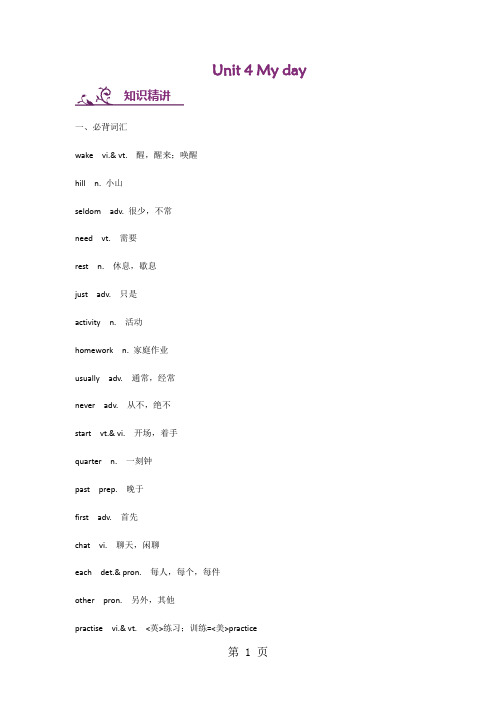
Unit 4 My day 知识精讲一、必背词汇wake vi.& vt. 醒,醒来;唤醒hill n. 小山seldom adv. 很少,不常need vt. 需要rest n. 休息,歇息just adv. 只是activity n. 活动homework n. 家庭作业usually adv. 通常,经常never adv. 从不,绝不start vt.& vi. 开场,着手quarter n. 一刻钟past prep. 晚于first adv. 首先chat vi. 聊天,闲聊each det.& pron. 每人,每个,每件other pron. 另外,其他practise vi.& vt. <英>练习;训练=<美>practicewish n. 希望,祝愿vt. 希望,祝愿life n. 〔pl. lives〕生活;生命luck n. 好运,幸运museum n. 博物馆twice adv. 两次picnic n. 野餐once adv. 一次dislike n. 不喜欢,厌恶reason n. 原因,理由ready adj. 准备好,准备完毕learn vt.& vi. 学,学习,学会world n. 世界二、重点词汇1. seldom adverb /ˈseldəm/almost never很少;几乎从来没有例句:Now that we have a baby, we seldom get the chance to go to the cinema.有了孩子以后,我们很少有时机看电影了。
We seldom receive any apology when mistakes are made.出错的时候,我们很少听到抱歉的话语。
2. activity noun /ækˈtɪvəti/the situation in which a lot of things are happening or people are moving around活泼;繁忙;热闹例句:There was a lot of activity in preparation for the Queen's visit.大家都在为准备迎接女王来访而繁忙。
牛津译林版七年级英语上册Unit4-重点词组、难点解析、语法知识点复习
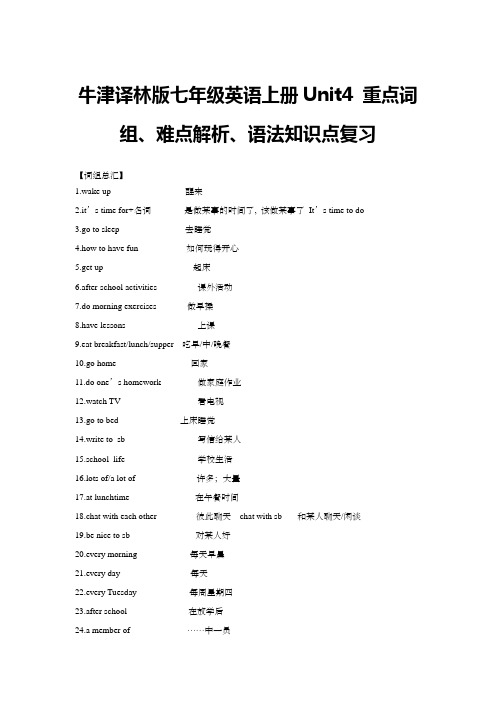
牛津译林版七年级英语上册Unit4 重点词组、难点解析、语法知识点复习【词组总汇】1.wake up 醒来2.it’s time for+名词是做某事的时间了, 该做某事了It’s time to do3.go to sleep 去睡觉4.how to have fun 如何玩得开心5.get up 起床6.after-school activities 课外活动7.do morning exercises 做早操8.have lessons 上课9.eat breakfast/lunch/supper 吃早/中/晚餐10.go home 回家11.do one’s homework 做家庭作业12.watch TV 看电视13.go to bed 上床睡觉14.write to sb 写信给某人15.school life 学校生活16.lots of/a lot of 许多;大量17.at lunchtime 在午餐时间18.chat with each other 彼此聊天chat with sb 和某人聊天/闲谈19.be nice to sb 对某人好20.every morning 每天早晨21.every day 每天22.every Tuesday 每周星期四23.after school 在放学后24.a member of ……中一员25.the Swimming Club 游泳兴趣小组26.have a good time 玩的开心27.email sb 给某人发电子邮件28.play games 玩游戏, 进行比赛29.twice a week 一周两次30.have fun 娱乐,乐趣;开心P.27-3031.listen to the radio 听收音机32.make a model plane 制作模型飞机33.read newspapers 看报read books 看书34.write emails 写邮件35.watch football matches 看球赛36.watch too much TV 看电视太多37.listen to music 听音乐38.listen to the teacher 听老师讲39.walk a dog 遛狗40.a piece of good news 一则好消息41.in the school football team 在学校足球队42.all the time 一直43.know (a lot) about…对……了解(很多)44.read comic books 看连环漫画书45.on the volleyball court 在排球场46.from...to…从……到……47.meet up with sb. 约见某人48.do their homework 做他们的作业49.under a big tree 在大树下50.go to one’s dancing lesson 去上舞蹈课51.have (no) time to do sth. 有(没有)时间做某事52.have a lot of new friends 有许多新朋友53.teach us English 教我们英语54.talk about…谈论关于……55.at home 在家56.say hello to…向……问好P.31-3757.the Class 1,Grade 7 students 七年级一班学生58.go on a trip 旅行, 旅游have one’s trip59.look at the posters 看海报60.more than 多于;超过61.twice a week 一星期两次62.the China Space Museum 中国航空博物馆63.the China Science and Technology Museum 中国科技博物馆64.next Monday 下周一65.each student 每个学生66.thank you for doing sth 为做某事而谢谢你anize the class trip 组织班级旅游68.I would like to+动词原形愿意干某事;想要干某事69.the price for………的价格70.be open/be closed 开着、关着71.look forward to…期盼;盼望72.enjoy…very much 非常喜爱……73.need to do sth 需要做……74.borrow a pen 借一支钢笔75.be busy doing 忙于做某事76.be good for 有益于77.help sb do sth 帮助某人做某事78.get ready for 准备……79.learn more about 更多了解……80.the answer to ………的答案81.the Computer Club 电脑兴趣小组【难点解析】1.Is it time for breakfast? 是吃早餐的时间了吗?it’s time for+名词, “是做某事的时间了, 该做某事了”=it’s time to+动词原形.例如:It’s time for class.是上课的时间了。
Unit4单元测试必备知识点牛津译林版英语七年级上册
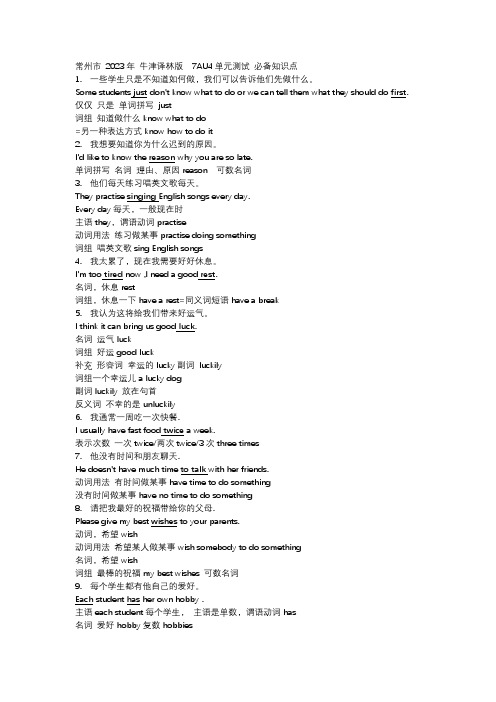
常州市2023年牛津译林版7AU4单元测试必备知识点1.一些学生只是不知道如何做,我们可以告诉他们先做什么。
Some students just don't know what to do or we can tell them what they should do first. 仅仅只是单词拼写just词组知道做什么know what to do=另一种表达方式know how to do it2.我想要知道你为什么迟到的原因。
I'd like to know the reason why you are so late.单词拼写名词理由、原因reason 可数名词3.他们每天练习唱英文歌每天。
They practise singing English songs every day.Every day每天,一般现在时主语they,谓语动词practise动词用法练习做某事practise doing something词组唱英文歌sing English songs4.我太累了,现在我需要好好休息。
I'm too tired now ,I need a good rest.名词,休息rest词组,休息一下have a rest=同义词短语have a break5.我认为这将给我们带来好运气。
I think it can bring us good luck.名词运气luck词组好运good luck补充形容词幸运的lucky副词luckily词组一个幸运儿a lucky dog副词luckily 放在句首反义词不幸的是unluckily6.我通常一周吃一次快餐.I usually have fast food twice a week.表示次数一次twice/两次twice/3次three times7.他没有时间和朋友聊天.He doesn't have much time to talk with her friends.动词用法有时间做某事have time to do something没有时间做某事have no time to do something8.请把我最好的祝福带给你的父母.Please give my best wishes to your parents.动词,希望wish动词用法希望某人做某事wish somebody to do something名词,希望wish词组最棒的祝福my best wishes 可数名词9.每个学生都有他自己的爱好。
牛津译林版七年级英语上册Unit4单元知识点总结
牛津译林版七年级英语上册Unit4Welcome to the unit1.Well, after breakfast I want to go to sleep, ...哦,早饭后我想睡觉……(1)after breakfast意为“早饭之后”,after 是介词,“在……之后”。
相关词组:after school放学之后;after class课后;after sb.跟在某人之后(2)go to sleep意为“入睡,睡着”,强调入睡的动作,这里的sleep是名词。
辨析:go to sleep, fall sleep 与go to bed①Go to sleep意为“入睡,睡着”,强调从醒着到熟睡的过程,是自然入睡。
②fall sleep意为“睡着”,强调“突然入睡”的意思。
③go to bed意为“上床睡觉”,强调上床睡觉这个动作,是否睡着不管。
2.You want to keep a diary too. 你也想记日记。
keep a diary 意为“记日记”,一般不用write a diary。
但如果是“做记录”,则可以用。
如:He is writing a diary for teaching. 他正在做教学记录。
Reading1.We always chat with each other or play games.我们总是相互聊天或做游戏。
(1)chat意为“闲谈,聊天”,既可作不及物动词,也可作名词。
作动词后带宾语时必须加介词with辨析:chat with 侧重于“闲聊”,而talk with/to 侧重于“谈话”,有时含有上级对下级,长辈对晚辈谈话的含义。
如:Our English teacher likes talking with us.我们的英语老师喜欢找我们谈话。
(2)each other意为“彼此,相互”,是相互代词,强调两者之间的“相互”,其名词所有格为each other's 。
Unit4知识点梳理2023-2024学年牛津译林版英语七年级上册
第三讲7AUnit4 Language Point 复习1.How often和How many times的区别①How often do you watch TV?I watch TV every day.How many times do you watch TV a week?I watch TV seven times a week.2.How often和How many times的区别②How often do you watch TV?How many times do you watch TV a week?How often= How many times +时间范围1. will he leave here?He will leave here in a month.A. How oftenB. How longC. How soonD. How many times2. does he watch TV.Once a week.A. How oftenB. How manyC. How longD. How soon3. I don't know he will get here.A. how longB. how soonC. how oftenD. how4. does he take this medicine?Twice a day.A. How soonB. How longC. How muchD. How often5. can you finish this work?A. How oftenB. How manyC. How longD. How soon6. have you been at this factory?I have been here since 1993A. how longB. how soonC. how oftenD. how many7. does your sister write to your parents?A. How soonB. How longC. How muchD. How often8. does it take you to finish you homework every day?.A. How oftenB. How manyC. How longD. How soon9. will he stay here?A. how longB. how soonC. how oftenD. how many10. did the meeting last?About half an hour.A. How soonB. How longC. How farD. How often3.Reading is fun.阅读是有趣的事。
Unit4知识点梳理牛津译林版七年级英语上册
牛津译林版七上Unit 4 知识点梳理1.Wake up, Eddie. 醒醒,埃迪。
wake up:“醒来”。
“唤醒某人”:如果所接宾语是人称代词,只能放在wake和up中间;如果所接宾语是名词,放在up、前后均可。
awake:adj.“醒着的”。
2.Is it time fro breakfast? 到吃早饭的时间了吗?It’s time for sth.“是做某事的时间了。
”= It’s time to do sth.It’s time for sb. to do sth.“该是某人做某事的时候了。
”3.Shall we go walking in the hills? 我们去山上散步好吗?Shall we...? “我们……好吗?”(表示征求或提出建议。
)4.I seldom go out. 我很少外出。
seldom:adv.“很少,不常,难得”(位于行为动词之前,助动词、情态动词或连系动词之后),表示否定。
go out:“出去”。
5....and then I have lunch. ……然后吃午饭。
have lunch:“吃午饭”。
→have breakfast “吃早饭”;have dinner/supper “吃晚饭”。
have:v.“吃;喝”;“有”;“举办,举行”;“度过,经历”。
三单:has。
6.After lunch, I always need a good rest. 午饭后,我总是需要好好休息。
need:v.“需要”。
need sth. “需要某物”;need to do sth. “需要做某事”;need sb. to do sth. “需要某人做某事”;sth. need(s) doing “需要”。
情态动词,“需要”,后接动词原形,常用于否定句和疑问句。
rest:n.“休息,歇息”(= break)。
have a (good) rest “(好好)休息”。
作动词,“休息”。
Unit 4 重要语法精讲 (时间介词 频度副词) 七年级上册英语单元核心知识(牛津译林版)
in 2023 in June in autumn in the morning/afternoon/evening
01 时间介词in/on/at
on用于
星期 某一天 某一天的早中晚夜 被天气、季节等修 饰的早中晚夜 还有Day的节日
on Sunday on September 10th on the afternoon of Jnue 1st on a summer morning on a cold night on Children’s Day
1. There is a lot of snow _i_n___ winter. 2. Tom uaually have a rest __a_t __ noon. 3. We have a party _o_n___ the afternoon of June 1st. 4. Is your birthday _/____ this Friday? 5. —What‘s the time now?—It’s /____ 13 o’clock. 6. We meet _o_n___ a sunny morning.
04 随堂练习 填写适当的时间介词in/on/at,不需要介词的用“/”表示
6. Do you visit your grandparents _a_t__ the Spring Festival. 7. Tina often gets up _a_t___ half past six. 8. —What day is today? —It’s _/____ Monday. 9. She is going to Shanghai __o_n__ the morning of Mar. 13. 10. I have a PE lesson _o_n___ Tuesday afternoon.
- 1、下载文档前请自行甄别文档内容的完整性,平台不提供额外的编辑、内容补充、找答案等附加服务。
- 2、"仅部分预览"的文档,不可在线预览部分如存在完整性等问题,可反馈申请退款(可完整预览的文档不适用该条件!)。
- 3、如文档侵犯您的权益,请联系客服反馈,我们会尽快为您处理(人工客服工作时间:9:00-18:30)。
7A Unit 4基础练习一姓名_________
翻译句子(p42)
1.艾迪,起床。
__________________________________________
2.是吃早饭的时间了吗?__________________________________________
3.我们去山里散步好吗?__________________________________________
4.不,我很少出去。
__________________________________________
5.在早饭后,我睡觉,然后我吃午饭。
__________________________________________
6.在午饭后,我总是需要休息一下。
__________________________________________
7.有些狗就是不知道怎样玩乐。
__________________________________________
8.米莉写信给她的网友关于她的学校生活。
______________________________________
9.她也写了在学校喜欢的和不喜欢的事情。
______________________________________
10.告诉你的朋友关于你在校的一天__________________________________________
11.及你喜欢或不喜欢的事__________________________________________
填空并能表演
A; _______ _______ ,Eddie!
B:Is it time _________breakfast?
A;__________we go walking in the _________?
A:No,I __________ go_________, After ___________, I sleep, and then I have _______, After lunch, I _________ need a_________ __________.
B:Some dogs_________ don't________ how________ have f__________.
重点词组
1.把他叫醒__________________________________________
2.该上学了(写出两个)__________________________________________
3.我们打排球好吗?(shall)__________________________________________
4.我饿了,需要一个苹果。
__________________________________________
5.我累了,需要好好休息(写出两个)__________________________________________
6.我不知道如何学好英语。
__________________________________________
7.我知道何时上电脑课。
__________________________________________
8.玩得开心(写出两个句子)__________________________________________
7A Unit 4基础练习二姓名_________
翻译句子(p43)
1.在校的一天__________________________________________
2.看Millie’s时间表__________________________________________
3.我每天早上在6:30起床__________________________________________
lie每天骑车上学__________________________________________
5.做早操__________________________________________
6.上课__________________________________________
7.做课外活动__________________________________________
8.吃晚饭__________________________________________
9.我每天花2小时做作业__________________________________________
10米莉,你每天什么时候去学校?__________________________________________
11.我通常在7点20去学校。
__________________________________________
12.我上学从来不迟到。
__________________________________________
13.你们什么时候开始上课?八点一刻。
__________________________________________
14.你喜欢上学吗?是的。
我非常喜欢它。
__________________________________________ 填空
Aunt: Millie, __________ do you go to school ________ day?
Millie: I _________ go to school at 7:20. I'm ________ late ________ it.
Aunt: Good . What time do you________ _________?
Millie:At a ________ _________ eight.
Aunt:Do you ________school, Millie?
Millie:Yes I enjoy it _______ _________.
翻译
1.在7:20上学__________________________________________
2.我从来不迟到__________________________________________
3.开始上课__________________________________________
4.八点一刻__________________________________________
5.我非常喜欢学校__________________________________________。
